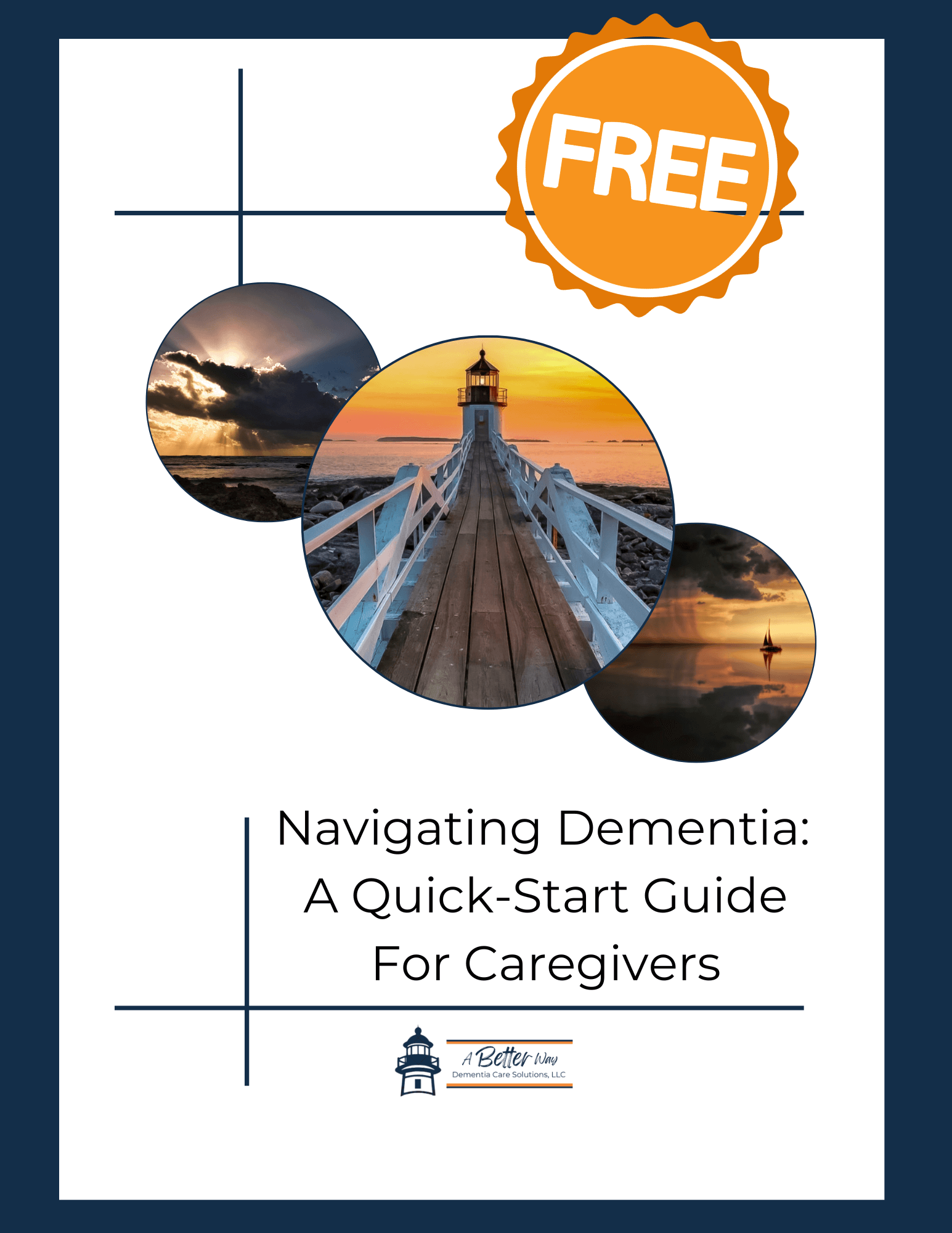
A Calmer Holiday Season in Dementia Care: An 8-Part Blog Series
The holidays can be beautiful, but for caregivers, they can also be a lot. Between changing routines, extra visitors, and emotional memories, this time of year can feel overwhelming.
That’s why I’ve created an 8-part Holiday Caregiver Series to help you navigate the season with more calm, confidence, and connection.
Each week, you’ll find realistic tips, heartfelt insight, and practical tools to support both you and t he per son you care for, so the holidays feel meaningful, not exhausting. Whether you’re preparing for gatherings, looking for dementia-friendly gift ideas, or simply trying to protect your own peace, this series is here to guide you through it.
Here’s What to Expect:
November: Preparing for the Holidays
1. Redefining Holiday Joy: Setting Realistic Expectations for Dementia Caregiving
December: Living the Holidays with Connection and Calm
7. Finding Calm When Holidays Feel Overwhelming In Dementia Care
8. Year End Reflection for Dementia Caregivers
You can click on any one to go directly to post. (As they are published)
So grab a cup of cocoa, take a deep breath, and let’s begin with Part One: Redefining Holiday Joy.
Redefining Holiday Joy: Setting Realistic Expectations for Dementia Caregiving
The holidays don’t have to be perfect to be meaningful.
For many caregivers, the holidays bring a mix of emotions: nostalgia, hope, exhaustion, and sometimes even grief. The sights, sounds, and smells of the season can stir up memories of what once was. You might find yourself wishing things could be like they used to be. But when you’re caring for someone with dementia, the way it used to be isn’t always possible anymore, and that’s okay.
This season, the goal isn’t perfection. It’s presence. It’s about redefining what joy, peace, and connection look like in this chapter of life.
1. The Emotional Weight of the Holidays
If you’ve been caring for someone with dementia for any length of time, you already know that emotional balance can feel fragile, especially around the holidays. The expectation to make everything special can collide with the reality of fatigue, unpredictable behaviors, and new limitations.
You might feel:
· Sadness for the memories your person no longer recalls.
· Frustration that others don’t understand what you’re managing behind the scenes.
· Pressure to keep up with family traditions, even when they no longer fit.
Let yourself feel all of it. Those emotions are valid. You’re human first, caregiver second. Recognizing these feelings helps you release them rather than letting them build into guilt or resentment.
2. How Dementia Changes the Holiday Experience
Dementia affects more than memory; it changes how a person processes sensory input, emotions, and routines. What used to bring joy may now cause confusion or agitation.
· Large gatherings may overwhelm.
· Bright lights and loud music can increase anxiety.
· Unfamiliar foods may decrease appetite or trigger distress.
· Changes in daily rhythm can disrupt sleep and mood.
It’s easy to forget that what feels festive to us may feel chaotic to the person you care for. Shifting your mindset toward simplicity and familiarity can completely change the atmosphere.
3. Redefining Holiday Joy
For caregivers, redefining joy means focusing on what feels good, not what looks good.
Ask yourself:
· What matters most to me and the person I care for right now?
· What can we let go of this year?
· What small, familiar rituals can we keep?
Maybe instead of hosting a full family dinner, you serve a simple meal with just a few close relatives. Maybe you skip the elaborate decor and choose gentle, nostalgic touches instead.
The heart of the holidays isn’t in how much we do; it’s in how connected we feel while doing it.
4. Setting Realistic Expectations (and Letting Go of Guilt)
Caregivers often feel caught between the expectations of others and the needs of the person they care for. But it’s impossible to make everyone happy, and that’s not your job.
Here’s what you can do:
· Plan around your person’s best time of day. If they’re calmer in the morning, host a brunch instead of dinner.
· Limit the length of events. Short and sweet is often best.
· Allow quiet breaks. Create a peaceful retreat area for rest if stimulation becomes too much.
· Keep routines predictable. Familiarity helps reduce anxiety.
Remind yourself: you’re not disappointing anyone by doing less. You’re doing what’s necessary to protect peace and preserve connection.
5. Preparing Family and Friends for What to Expect
One of the hardest parts of the season is navigating family members who may not fully understand dementia. They may expect the person to perk up because it’s Christmas or try to correct memory lapses. A little preparation can go a long way.
Sample message to send before gatherings:
“Mom has a harder time processing conversation when there’s a lot going on. It helps to speak slowly and gently, and not to quiz her about names or memories. She’s happiest when people just share stories or music she enjoys.”
Encourage visitors to:
· Focus on emotions, not facts.
· Speak calmly and make eye contact.
· Join in familiar songs or rituals.
· Avoid large, noisy crowds.
By setting these expectations early, you create a supportive environment for everyone.
6. Communication Tips That Prevent Holiday Tension
Sometimes the most loving thing you can do is protect your peace.
If family dynamics get tense, try these boundaries:
· Use “I” statements: “I’ve noticed Mom gets tired quickly, so we’re going to keep this visit short.”
· Be clear about limitations: “We won’t be traveling this year; it’s too hard for her routine.”
· Offer alternatives: “We’d love a short video call instead.”
You don’t have to justify your decisions. You’re making choices that serve your person’s comfort and your own well-being.
7. Planning the Day: The Holiday Care Plan
A simple written plan can make the day flow more smoothly and prevent overwhelm.
Your Holiday Care Plan might include:
· Wake-up and meal times
· Preferred clothing (avoid itchy or formal wear)
· Simple schedule (activity, rest, music, meal, quiet time)
· Who’s responsible for support tasks
· Emergency contact info
Pro tip: Post this plan on the fridge or share it via text with family members. It keeps everyone on the same page and prevents misunderstandings.
8. Making the Environment Peaceful
· Keep background noise low (soft instrumental music works best).
· Use warm-white lighting instead of flashing or blinking lights.
· Avoid strong candles or air fresheners that may overwhelm the senses.
· Keep decorations familiar and clutter-free.
· Include favorite holiday scents like baking cookies or pine if they bring comfort.
Even small changes, like switching blinking lights to steady glow, can reduce agitation.
9. Helping the Person You Care For Feel Included
Focus on participation, not performance. They don’t need to remember every detail to feel the joy of being part of it.
Try:
· Asking for their input while decorating.
· Listening to familiar music together.
· Helping wrap simple gifts.
· Watching a favorite holiday movie.
· Looking through old photos or ornaments and sharing stories naturally.
Even brief, calm interactions can foster deep emotional connection.
10. Choosing Simplicity Over Perfection
Your person may not remember the event tomorrow, but they will feel your calm, your tone, and your presence. When you simplify, you give yourself and them the gift of peace.
Let this season be about connection, not comparison. A quiet cup of cocoa and soft music can be more meaningful than a perfectly hosted dinner.
11. Products That Make the Holidays Easier for Caregivers
Noise-cancelling headphones or earplugs: for both caregiver and person during noisy events. Buy on Amazon
Digital daily calendars: to help maintain orientation. Buy it on amazon
Weighted lap blanket: reduces restlessness during gatherings. Buy it on amazon
Journal: a journal designed for caregivers just like yourself. Daily prompts and affirmations to bring comfort and joy. Buy on amazon
12. Remember: You Deserve Joy Too
You’re doing an extraordinary job in an extraordinary circumstance.
Give yourself permission to slow down, say no, and create boundaries that protect your energy. The people who truly understand will support you, and the rest will adapt. My dad always used to say this to me when I was younger: ‘Those that mind don’t matter and those that matter don’t mind.’
You can’t pour from an empty cup. This season, make space for rest, laughter, and small moments that refill your spirit.
Call to Action
Click here to download your free “Holiday Planning Checklist for Dementia Caregivers.”
It’s a simple, printable guide to help you organize meals, manage visitors, and create a calm environment so you can focus on what matters most: connection.
IF YOU ARE MOVING THROUGH THE HOLIDAYS FEELING STRETCHED THIN, I AM HERE.
My dementia care coaching sessions give you a calm space to sort through what is working, what feels hard, and what would help you feel steadier day to day. We build a simple plan that fits your real life, not an ideal one.
If you want support, clarity, or even just someone who understands what you are carrying, you can learn more or schedule a session here: CLICK HERE
Notes
- Alzheimer’s Los Angeles. (2030). Holiday tips for caregivers. https://www.alzheimersla.org/holiday-tips-for-caregivers-2023/
- Alzheimer’s Association. (2021). Dementia related behaviors. https://www.alz.org/getmedia/f7b40c51-5ff7-4bc8-9056-342754d6cc65/alzheimers-dementia-related-behaviors-ts.pdf
- National Institute on Aging. (2023). Caring for a person with Alzheimer’s disease. https://www.nia.nih.gov/health/alzheimers-caregiving
- World Health Organization. (2023). Dementia: Key facts. https://www.who.int/news-room/fact-sheets/detail/dementia
Affiliate Disclosure
A Better Way - Dementia Care Solutions, LLC participates in the Amazon Associates Program, which means we earn a small commission when you buy through links on our site, at no extra cost to you. We only recommend products that we believe can help caregivers on their journey.
Disclaimer
The information provided in this blog is for educational purposes only and should not be considered medical advice. Always consult with a doctor or a licensed physical therapist before starting any new exercise routine, using assistive devices, or following the recommendations mentioned. Every individual’s needs are different, and professional guidance is essential to ensure safety and appropriateness of care.
Want to keep figuring this out together?
Subscribe to Finding Our Way in Dementia Care and get honest stories, helpful tips, and gentle support delivered to your inbox every week. Just real talk, grounded care, and space to breathe.
Subscribe to Finding Our Way in Dementia Care and get honest stories, helpful tips, and gentle support delivered to your inbox every week. Just real talk, grounded care, and space to breathe.
Kind truth. Clear steps. Warm guide.

















0 Comments